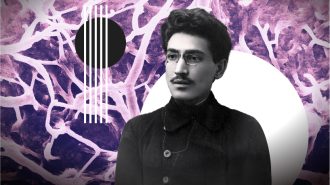"The tail is a very useful thing and modern man could use it". Alexander Markov and Olga Orlova discuss the evolutionary meaning of tail loss in episode 14 of the CounterEvolution podcast.
biology
Current demographic dynamics suggest radical changes around the world. Fertility will fall everywhere, but the main problems are not related to this, but to uneven population growth in different countries. Scientists predict a huge increase in the proportion of Africans by 2100 and a marked depopulation of Europe and North America. Alexander Markov and Olga Orlova discuss the main demographic shocks in the 10th episode of the CounterEvolution podcast.
Could humans have done without religion in their development? Apparently not. Whatever the genesis of religious consciousness, our mind is so organised that belief in the supernatural, omens, fortune-telling, and spirits is almost inevitable. Alexander Markov, Doctor of Biological Sciences, talks about this in episode 12 of the CounterEvolution podcast.
Approximately 4% of the world's people suffer from depressive disorder, and this figure is higher in women than in men. In the past, doctors used to call it melancholia and could not find a universal treatment. Now they have learnt to cope with depression quite well. And thank God, says Doctor of Biological Sciences Alexander Markov. This is the 11th episode of the CounterEvolution podcast.
The full-fledged work of the YouTube video service in Russia is gradually ceasing. What do scientists, leading million-viewer channels, and bloggers who popularize science think about this? Astrophysicists Sergey Popov, Vladimir Surdin, historian Mikhail Rodin, popularizers of science Vlad Goncharuk, Evgenia Timonova and Vitaly Egorov answer.
The twelfth essay in the series "Creators" is dedicated to Pavel Semyonovich Galtsov, an outstanding marine biologist who changed the entire oyster industry in America and became the founder of mollusc biology. Together with RASA (Russian-American Science Association) T-invariant continues publishing a series of biographical essays "Creators" about people from the Russian Empire who made a significant contribution to world science and technology, about those to whom we owe our new reality.
Within the project “Creators” T-invariant together with RASA (Russian-American Science Association) continues to publish a series of biographical essays about people from Russian Empire, who made a significant contribution to world science and technology. Alexander Petrunkevitch was born in the Chernigov Governorate, but most of his life he worked at Yale University. He became especially famous for his research on arachnids.
T-invariant, in collaboration with RASA, is launching the "Creators" project. The project will publish a series of essays on immigrants from the Russian Empire who have made significant contributions to global science and technology. The first essay is dedicated to Selman Waksman, Nobel Prize winner and discoverer of streptomycin.









